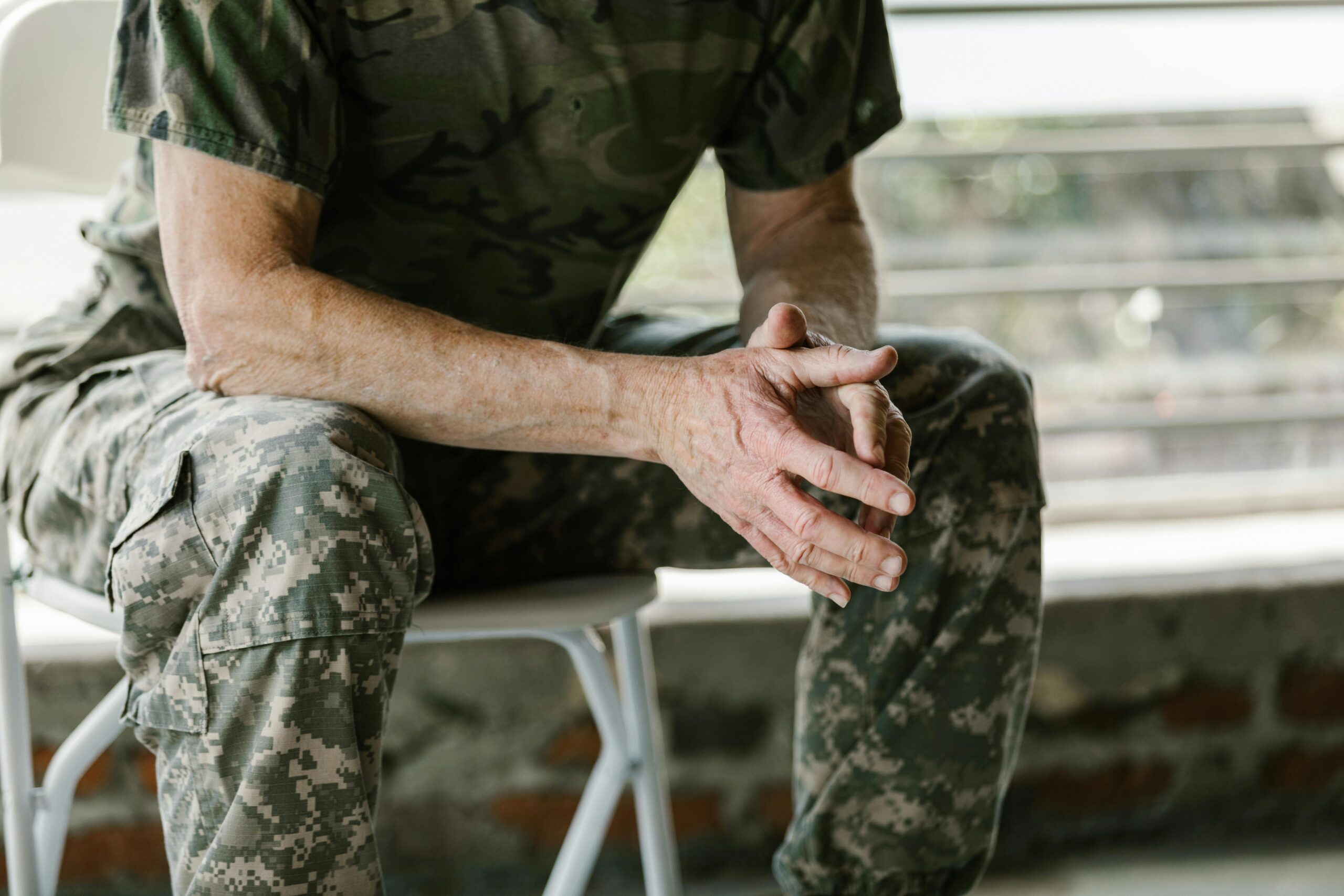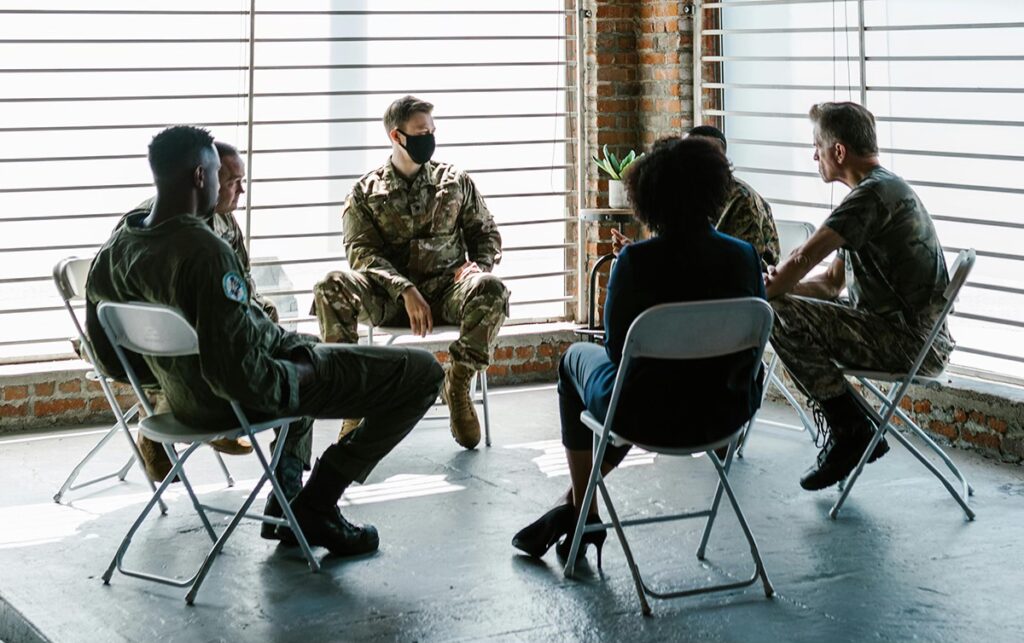From Brotherhood to Healing: Steve Wood’s Journey.

Steve Wood, co-founder of Heroes United, was 17 and fresh out of high school when he enlisted in the United States Marine Corps. He freely admits his younger self was attracted to the uniform. And to the camaraderie that he had heard about and seen portrayed in movies like Clint Eastwood’s Heartbreak Ridge, which came out about the time he joined up. He wanted to be part of the brotherhood. Decades later, he says he would do it all over again. Still, as he remembers it, the experience was initially nothing less than “eye-opening”—a total “culture shock” for a kid born in a small town in northwestern Wyoming.
Training was rigorous—and repetitive. “There’s one thing they drive into you from the very beginning,” Steve says. “Everybody in the Marines is a rifleman from day one, so you better learn how to shoot quick.” Specializing in tactical shooting, he served in Desert Shield and Desert Storm, where his combat unit forged in training was tested in combat. “You depend on your squad to take care of you,” he says, “and in turn you’re responsible for them. That brotherhood is for life.”
But after two and a half years in service, Lance Corporal Steve Wood was medically discharged. “I blew out my knees,” he says. “Just wear and tear.” That’s when the bottom fell out of his life. “The military has spent centuries perfecting how to make a soldier, but they have not taught anybody how to go back to civilian life,” he explains.“ When you’re done in the military, it’s a bus ticket or plane ticket home and goodbye.”
With his support system gone, Steve felt totally disconnected. Out on a limb is how he describes it. “In the Marines, you know what you’re expected to do. You know what you need to do to get your job done. You make it happen no matter what.” But in the outside world people don’t always subscribe to or even share that sense of purpose, that dedication, and that drive. If growing from a teenager into a soldier was “eye-opening,” moving on from being a soldier to a civilian was “tough.”and emotional grounding that’s hard to recreate anywhere else.

The transition was complicated in no small measure by pride. “You learn pride in the Marines, pride in yourself, pride in your team,” Steve says. But that pride can be a double-edged sword. “It can also lead you to believe that you don’t need anybody, that you can do it on your own,” he continues. “You just kinda isolate yourself from the world. That’s what happened to me.”
As to why some servicemen and women retreat into themselves, Steve doesn’t hesitate. It goes back to training. “Don’t be a liability. That’s what they teach us. You don’t wanna put your burdens on other people. Don’t be a liability. That’s a stigma that we carry.” So, here’s his advice for soldiers of any age upon leaving the service: “Don’t be afraid to ask for help. It is the hardest thing for any veteran to do. I understand that completely. But when I finally did, it was one of the best steps I made.”
In his isolation, Steve regrets that he didn’t stay in touch with his squad. He doesn’t want others to repeat his mistake. Stay in touch with your mates, he advises, maintain a connection. They’re the ones who have the “credentials” when you need help. “Credentials”—that’s Steve’s word for qualifications. They’ve gone through what you’ve gone through. They’re the ones you feel most comfortable talking to about things. You share the same jokes (dark though they may be). “It’s like putting on an old pair of shoes,” when you meet up. “They know how you feel. Reuniting brings you back to a familiar place.”
“I am still searching, trying to find that joy in life. It’s what I strive for,” Steve says, with optimism in his voice. “And if I can help make another person’s life a little bit brighter—even if it’s just for a second—that’s a win. That’s a win for me.”
Whether running into other vets informally in the gym or through various nonprofit organizations today, Steve finds “the mental scars are the same” for those who served in the Gulf War, Afghanistan, or Vietnam. The conflicts may be different but the feelings cross generations. And because soldiers speak the same lingo “they understand the conversation,” Steve says—in ways that doctors with degrees after their name but no combat or military experience cannot. Professionals like those “don’t understand what you’re going through. They want to help, and that’s okay. But it isn’t okay to just throw a pill at you and send you on your way. There’s no magic pill to fix things.”
Steve was lucky though. He found someone—a veteran social worker/therapist—who listened and related. “Sometimes you just need to sit in a dark place, and be met in that dark place. He saw where I was coming from. Sometimes you have to hit the bottom to find the only place to go is up.”
And for those on the way up, there’s Heroes United, which Steve calls a “one-stop shop.” “If Heroes United can get vets back together with their friends, as it does with its Squad Reunion Adventures, that’s part of the healing process,” he says. Recognizing veteran-owned and operated businesses, as the organization does, is another. “I’m very into these guys,” Steve confides with evident admiration. “They’re very driven. They take their pain and put it into building something. And their business success is a carry-on from the military. They’ve fought a battle, they’ve adapted, and they’ve overcome.”
The military remakes you. The military makes you hard. But it is Steve’s opinion that most veterans are humble. Most who have served their country neither seek glory nor want recognition. Most just want to get back to a joyful and peaceful life. That’s what he wants.




